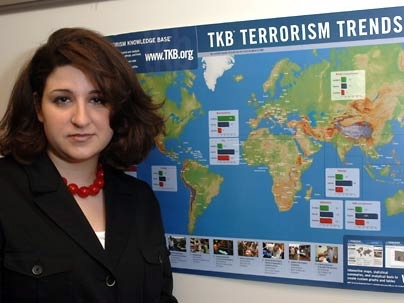An MIT graduate student has received a fellowship from a U.S. Department of Homeland Security-funded research center to study the "jihad effect" - that is, how wars impact the trajectory of terrorist movements.
Â
Stephanie Kaplan, a Ph.D. candidate in political science, plans to use the funds she receives from the National Consortium for the Study of Terrorism and Responses to Terrorism (START) to support her work on the relationship between armed conflicts and terrorism.
Â
Kaplan is particularly interested in the way the Iraq war has shaped and will shape the future of al Qaeda. Ultimately, she hopes to contribute to improving the formulation and practice of U.S. counterterrorism policy.
Â
"Regardless of how the war ends, whether the United States leaves Iraq now or stays in the months and years ahead, we must understand how the conflict has mobilized new assets on behalf our enemies--skilled people, weapons, money, social bonds and legitimacy--and to what end those assets will be deployed in the future," Kaplan says.
Â
"It is far better to begin this conversation now than years from now, when the jihad effect will be felt in full force," she adds.
Based at the University of Maryland, College Park, START is a Department of Homeland Security "Center of Excellence" charged with researching how terrorist groups form and behave and on how societies may best respond to terrorist threats.
For Kaplan, MIT provides an ideal venue to develop new concepts for understanding terrorism within the field of political science.
"When it comes to counterterrorism, all too often the focus remains at the operational level--catching the next operative and foiling the next attack. This is a matter of mindset, but it is also a matter of time--in Washington, very few people have the luxury to step back and process the information coming at them in a long-term, strategic manner. I came to MIT so that I could figure out what that big picture is and do so in a rigorous way. And the political science department and Security Studies Program here at MIT are perfect homes in which to do that," she says.
This year, Kaplan will work as a teaching assistant in a political science course, American Public Policy for Washington Interns, designed for MIT students in the Institute's summer Washington internship program.
Before coming to MIT, Kaplan worked in several policy capacities in Washington, D.C., including as a staff member on the National Commission on Terrorist Attacks upon the United States, known as the 9/11 Commission.Â
Â
Kaplan, who was managing editor of the commission's final report, treasures one memory of her experience above all others - a late-night walk around ground zero after a marathon session with the staff investigating New York City's emergency response.
"The gravity of 9/11 combined with the responsibility of carrying out the investigation really hit home," she says.
A native of Arlington Heights, Ill., Kaplan received a B.S. in foreign service from Georgetown University in 2000; she came to MIT in 2004.
A version of this article appeared in MIT Tech Talk on September 19, 2007 (download PDF).






